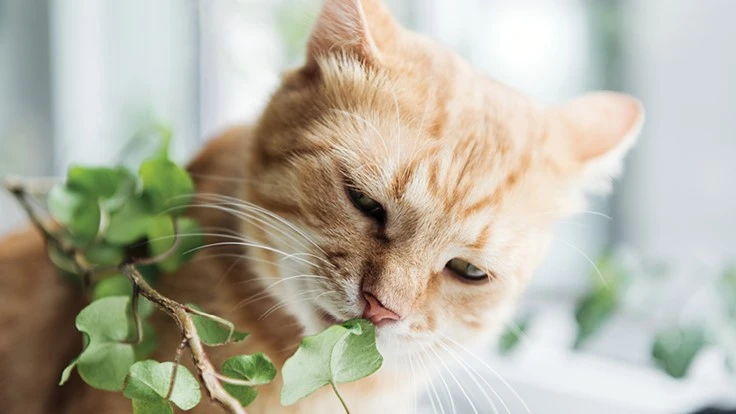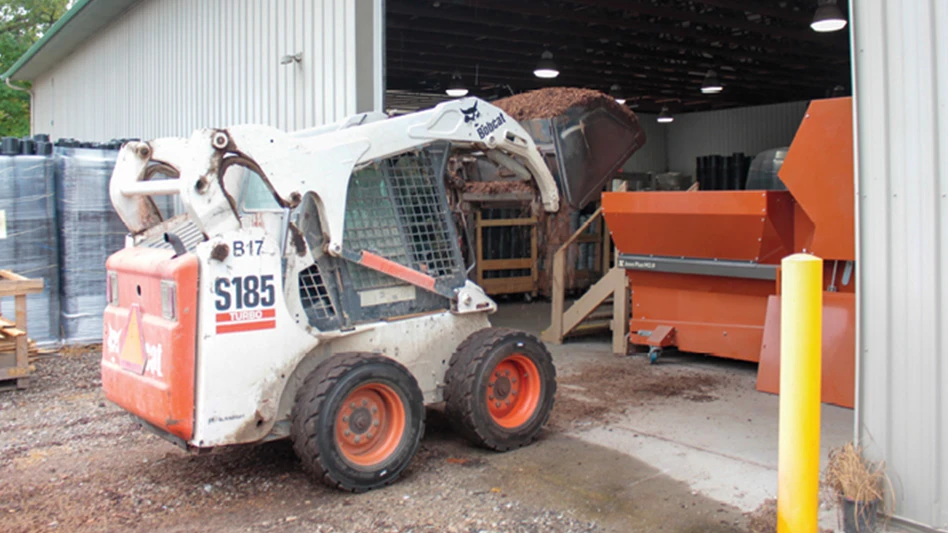
PHOTO © LIGHTFIELD STUDIOS | ADOBE STOCK

As houseplants enjoy another wave of intense popularity, horticulturists are getting a lot more questions about pet-safe plants. Just a couple of weeks ago, a friend of mine messaged me asking how to ID cat-safe houseplants after her furry baby chewed on a plant and spent a few days at the emergency vet. While pets and plants can happily co-exist, there are risks associated with many plants that we keep both indoors and out. Most home hobby plant keepers and gardeners have no idea how many commonly kept plants are toxic to their pets.
Pets and plants usually go hand-in-hand in our business. People who love plants usually also love pets. Even so, when I’m asked for resources on how to prevent plant related pet poisonings, I don’t usually direct them to any specific garden center website, but rather the ASPCA’s poisonous plants list (aspca.org/pet-care/animal-poison-control/toxic-and-non-toxic-plants).
Each year, the organization publishes it’s “Top 10 Toxins” for pets. Plants and garden products consistently occupy the 9th and tenth spots on the list, respectively, year after year. Most garden centers that do reference plant toxicity or pet-safe plants on their websites usually redirect visitors to the ASPCA site.
Common knowledge
Unfortunately, many of the popular houseplants happen to be some of the more toxic species for common pets. Philodendron, ZZ plants, ficus, pilea, African violet and aloe are easy plants for beginners, but toxic to dogs and cats. Many common garden plants, including most culinary herbs, are also toxic to our household critters. Because there are a few important exceptions such as basil and catmint, which are safe for your kitties to munch on, many gardeners wrongly assume other garden herbs are safe as well.
Often, it’s only after someone has had to race to the emergency vet, or worse, lost a beloved pet, before they discover specific plants in their home or garden are toxic. While linking to or directing your customers to the ASPCA is fine, it seems to me you’re giving away a lot of agency — and customer traffic — by doing so. Independent garden centers should be the experts and take the extra steps to help their customers safely cohabitate their pets and plants.

Staff education
How familiar is your garden sales staff with pet-safe plant choices? If you haven’t yet done in-house training, now’s the time. Given the large number of house and garden plants that are toxic, a faster training solution is to single out pet-safe plants in your inventory and make sure all of your customer-facing staff has a list of at least 10 pet-friendly options they can suggest to customers off-hand.
Signage
If you invite your customers to bring their pets in to shop, make the effort to label pet-friendly plants, as well as key plants that are highly toxic to dogs and cats.
Clear signage with specific warnings — or an icon system — will help your customers feel more confident about their plant choices. Your pet-owning customers will love you for it.
If you’re moving more houseplants these days, which I suspect you are, consider curating a pet-safe houseplants collection section. Just imagine how much easier shopping will be for those customers and how much their average sale might increase because you’ve made great choices easy for them.


Keep the traffic
Why redirect your customers to someone else’s website for pet-friendly plant info when they started at your website? Consider creating a special section on your website, or at minimum, a downloadable handout with your top pet-friendly plant picks. You might also do the same for pet-toxic plants. Keep some hard copies of these lists in the garden center so customers and staff can refer to them in person while shopping.
Get paws-on
Host a pet-friendly plants workshop and invite customers to bring their pups along. Many less experienced and new plant keepers are very uncertain about their plant ID skills. Doing some hands-on plant show and tells for both toxic and safe plants will put these customers at ease. Create a “tasting buffet” of healthy pet-safe herb plants their pets can sample. You might just attract an entirely new group of customers, especially new indoor gardeners.
When it comes to our pets, there is nothing worse than realizing we could have easily prevented their sickness, or even loss, if we’d only known a little more about the plants we keep. Partner up with your pet-loving customers to make sure your plants and their pets live happily ever after.

Explore the June 2019 Issue
Check out more from this issue and find your next story to read.
Latest from Garden Center
- Leading Women of Horticulture: Emily Showalter, Willoway Nurseries
- Garden Center 2025 Top 100 IGCs List open for submissions with new judging criteria
- Meet the All-America Selections AAS winners for 2025
- AmericanHort urges exclusion of sphagnum peat moss from proposed Canadian tariff
- VIDEO: Garden Center's 2024 State of the Industry Report
- The Growth Industry Episode 2: Emily Showalter on how Willoway Nurseries transformed its business
- Farwest Show calls for 2025 New Varieties Showcase entries
- Oregon Nurseries Hall of Fame member Jack Bigej passes away





